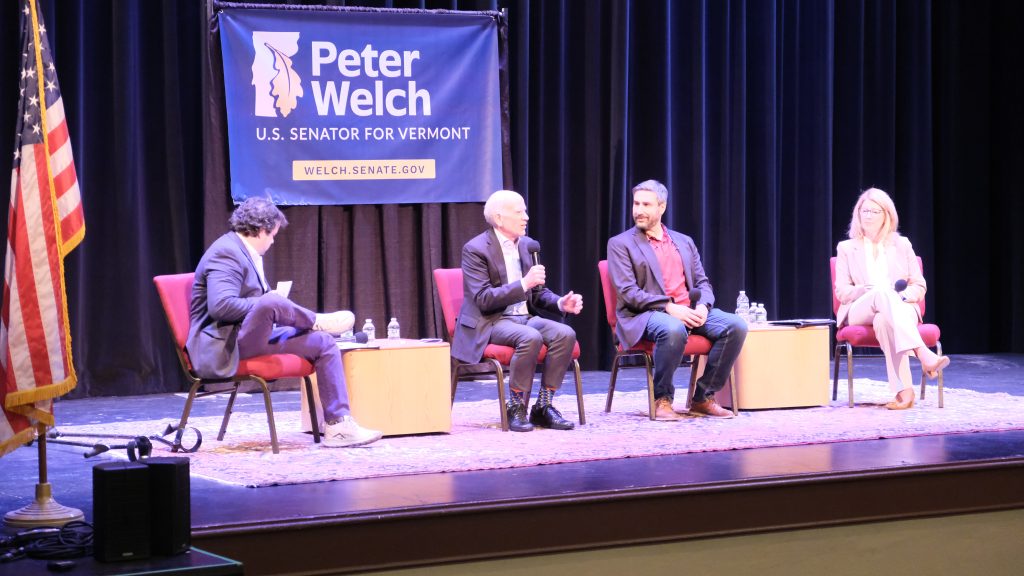
U.S. Sen. Peter Welch, D-Vt., says he will fight the “Big Beautiful Bill” however he can.
“This bill should be defeated, not amended,” Welch told a crowd at the Paramount Theatre in Rutland on Wednesday evening. “I don’t know if it’s going to pass or not, but I’m going to do every single thing I can to keep it from passing.”
Welch characterized the bill — a mix of policy and tax legislation that is in the U.S. Senate after passing the House by a single vote last week — as a tax cut for the rich at the expense of the rest of the country.
“What I find really poignant, almost heartbreaking, is … regardless of whether you voted for Trump, you voted for Harris — that doesn’t matter. This is going to affect folks that are in Idaho, that are in Texas, that are on Medicaid.”
Welch addressed the audience at a “community conversation” where he was joined onstage by Rutland Mayor Mike Doenges and Rutland Regional Medical Center CEO Judi Fox. Questions to the trio — though most seemed addressed to Welch, whether specifically or otherwise — were submitted in writing, but Welch fielded a few that were shouted from the audience as the talk touched on the war in Gaza.
On that subject, Welch said Israel’s restrictions on aid into Gaza were unacceptable.
“Let’s step back and acknowledge what Hamas did on Oct. 7 as appalling, absolutely appalling,” he said. “Israel had a right to defend itself. Then there’s a question of proportionality and what’s effective.”
Welch said Israel has succeeded in “degrading Hamas” and “all but destroying Hezbollah” and, meanwhile, Gaza is starving.
“We cannot condone the starvation of people,” he said. “We need to be doing everything we can to encourage the Israeli government to meet its responsibility under international law. Starvation cannot be a tool of war.”
Welch talked about Israeli peace activists he knew who lost loved ones to Hamas in the Oct. 7 attacks, and stressed that he had nothing but contempt for the organization. He said he continues to back a two-state solution and believes an international force would be needed to provide stability in Gaza.
“The cycle is getting worse and worse and worse,” he said. “We have a situation that is just not acceptable.”
The other two panel members had the most to say on the subject of tariffs. Fox said they were likely to raise costs for the hospital, which would have to be met at the expense of programming. She said they had trimmed $15 million in expenditures in recent years to offset inflation.
“That becomes harder and harder every year,” she said. “We don’t know what the impact will be. It’s a wait-and-see game.”
Doenges said the tariffs pose a similar threat to the city.
“Fun fact: Fire hose is not cheap,” Doenges said. “Second fun fact: We get our fire hose from Canada. Not to add another layer to this, but some of our fire hose was paid for from a federal grant.”
Numerous federal grant programs are under threat, and Doenges said it is difficult to budget 18 months out not knowing what materials or equipment are likely to cost or what funding is going to be available. Welch said this also is a problem in the private sector.
“Regardless of what your politics are, you can’t operate a business where the cost of materials you need changes day-to-day … at the whim of someone who won’t tell you what he’s doing,” Welch said.
Welch said some local businesses have shipments they cannot afford to unload and don’t have the access to the President that has allowed larger business-owners to get tariffs waived.
Welch said the administration’s corruption and its attacks on the judiciary were a frightening combination. The president’s comments about judges who rule against him, Welch said, have resulted in physical threats.
“Then we have (Vice President) JD Vance saying if that’s the judge’s decision, let him enforce it,” Welch said. “That is where we get knee-deep, waist-deep, into a constitutional crisis.”
One woman speaking from the audience pushed Welch to name a leader to take the Democratic Party into the 2028 election. Welch — who stated during a different part of the discussion that he had no interest in running for president himself — said he could not name anyone and that people needed to let such a leader emerge.
“Think back to 1992 when there was this young governor from Arkansas,” he said. “Nobody had heard of him until they heard of him. … In 2008, who ever had heard of a senator named Barack Hussein Obama?”
The event closed on a question that Moderator Ryan McLaren, a Welch staffer, said he’d received in various forms: “What can we do?”
“Be inquisitive,” Fox said. “Become educated. Don’t take what you hear in media necessarily as truth and fact.”
Doenges said to “get involved.”
“We see the same players year after year after year … but there are a lot more people out there with thoughts and opinions and ideas,” he said. “When people get involved and step up, it has an impact.”
Welch said to not be afraid to try.
“The hardest thing is to take on a challenge which is so hard … when you don’t know what the outcome is, but everything within you says the outcome you fear is the outcome you can’t accept,” he said.
Story Written by Gordon Dritschilo, Times Argus
